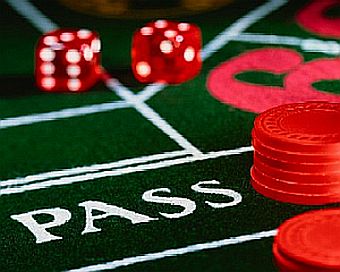Craps Card Game

2 days ago What's the best way to master the game of craps? Practice play for free is your best bet to learn! It is beneficial to all whether a beginner, advanced, low or high roller. Shake that overwhelming feeling and build the confidence needed to win more often. Craps is the fastest-moving of casino table games. An average speed at a busy blackjack table runs around 60 hands per hour, but the house expects about 100 decisions per hour at craps. That, along with the tendency of craps players to have several bets working at once, means that craps requires a larger bankroll than other table games. Craps is the most popular dice game in the world, with a history that dates back hundreds of years. It can be found in most offline and online casinos, including right here at Casino.com, with a variety of online Craps and Live Casino Craps to explore.
| Players | 2+ |
|---|---|
| Setup time | < 1 minute |
| Random chance | High, Dice rolling |
| Skill(s) required | Luck, Hands, Betting, Ability to Cheat |
Hazard is an early English game played with two dice; it was mentioned in Geoffrey Chaucer's Canterbury Tales in the 14th century.
Despite its complicated rules, hazard was very popular in the 17th and 18th centuries and was often played for money. At Crockford's Club in London, hazard was especially popular. In the 19th century, the game craps developed from hazard through a simplification of the rules. Craps is now popular in North America but neither game remains popular amongst the rest of the world.
Rules[edit]
Any number may play, but only one player – the caster – has the dice at any one time.
In each round, the caster specifies a number between 5 and 9 inclusive: this is the main. He then throws two dice.
- If he rolls the main, he wins (throws in or nicks).
- If he rolls a 2 or a 3, he loses (throws out or outs).
- If he rolls an 11 or 12, the result depends on the main:
- with a main of 5 or 9, he throws out with both an 11 and a 12;
- with a main of 6 or 8, he throws out with an 11 but nicks with a 12;
- with a main of 7, he nicks with an 11 but throws out with a 12.
- If he neither nicks nor throws out, the number thrown is called the chance.[1] He throws the dice again:
- if he rolls the chance, he wins;
- if he rolls the main, he loses (unlike on the first throw);
- if he rolls neither, he keeps throwing until he rolls one or the other, winning with the chance and losing with the main.
This may be simpler to follow in a table:
| Main | Nicks | Outs | Chance |
|---|---|---|---|
| 5 | 5 | 2,3,11,12 | 4,6,7,8,9,10 |
| 6 | 6,12 | 2,3,11 | 4,5,7,8,9,10 |
| 7 | 7,11 | 2,3,12 | 4,5,6,8,9,10 |
| 8 | 8,12 | 2,3,11 | 4,5,6,7,9,10 |
| 9 | 9 | 2,3,11,12 | 4,5,6,7,8,10 |
The caster keeps his role until he loses three times in succession.[2] After the third loss, he must pass the dice to the player to his left, who becomes the new caster.

Betting[edit]

Bets are between the caster and the bank (the setter), which may be the remaining players acting as a group.
If the caster nicks on the first throw, he wins an amount equal to his stake. After the first throw, the caster wins his stake if he gets his chance before his main.
After the first throw, the caster (and others, via side bets) may wager an additional sum that the chance will come before the main. These bets are made at odds determined by the relative proportions of the main and the chance:
| Main | Chance | ||||||
|---|---|---|---|---|---|---|---|
| 4 | 5 | 6 | 7 | 8 | 9 | 10 | |
| 5 | 4/3 | — | 4/5 | 2/3 | 4/5 | 1/1 | 4/3 |
| 6 | 5/3 | 5/4 | — | 5/6 | 1/1 | 5/4 | 5/3 |
| 7 | 2/1 | 3/2 | 6/5 | — | 6/5 | 3/2 | 2/1 |
| 8 | 5/3 | 5/4 | 1/1 | 5/6 | — | 5/4 | 5/3 |
| 9 | 4/3 | 1/1 | 4/5 | 2/3 | 4/5 | — | 4/3 |
For example, with an odds stake of £10, a main of 7 and a chance of 5, a caster stands to win £15 (3/2 × £10); with the same stake, a main of 5 and a chance of 6, he could win £8 (4/5 × £10).
Probability of winning[edit]
For each main the probability of winning can be calculated:
| Main | Probability of winning | Disadvantage to caster |
|---|---|---|
| 5 | 0.492 | 1.52% |
| 6 | 0.488 | 2.34% |
| 7 | 0.493 | 1.41% |
| 8 | 0.488 | 2.34% |
| 9 | 0.492 | 1.52% |
In some reports[3] on the rules of the game, the main is determined randomly by tossing the dice until a valid main appears. In this case the overall player disadvantage is 1.84%. If the caster can choose a main, he should always choose 7 (resulting in the lowest disadvantage, with 1.41%). This is the origin of a similar dice game, craps, since if 7 is always chosen the game devolves into craps.
Etymology of the name[edit]
The name 'hazard' is borrowed from Old French. The origin of the French word is unclear,[4] but probably derives from Spanishazar ('an unfortunate card or dice roll'), with the final -d by analogy with the common French suffix -ard.[4][5] The Spanish word has been supposed in turn to come from Arabic, either from the name of a castle in Palestine,[4] or from the word az-zahr (الزهر) meaning 'dice'.[4][5] However, early evidence for this word in Arabic is lacking, as it is absent from Classical Arabic dictionaries, making the etymology doubtful (although any other source is unknown).[4][5] Another possibility is Arabic yasara ('he played at dice').[5]

Derivations from Hazard[edit]
From the game of Hazard came the modern terms:
Craps Casino Card Games
- Possibly, the phrase 'at sixes and sevens' (another possible derivation is discussed under that article). 'Set upon six and seven' first appeared in Chaucer's Tales relating to betting one's entire fortune on a single throw of the dice. Over time the phrase became associated with any circumstances involving general confusion or disorder.
- The word 'hazard' in its modern sense of 'risk' or 'danger'.
References[edit]
:max_bytes(150000):strip_icc()/GettyImages-78532553-58f9222b5f9b581d59cad754.jpg)
- ^Chisholm, Hugh, ed. (1911). 'Hazard' . Encyclopædia Britannica. 13 (11th ed.). Cambridge University Press. p. 117.
- ^Steinmetz, John. [1]Archived 2000-01-26 at the Wayback Machine 'The Gaming Table'.
- ^Scarne on Dice, John Scarne (1980)
- ^ abcde'Hazard'. Oxford English Dictionary. Retrieved 11 August 2009.
- ^ abcd'Hazard'. Online Etymological Dictionary. Retrieved 11 August 2009.
Further reading[edit]
| Look up hazard in Wiktionary, the free dictionary. |
- Steinmetz, Andrew (1870). The Gaming Table, Volume II, Chapter X. (Online edition available at World Wide School.)